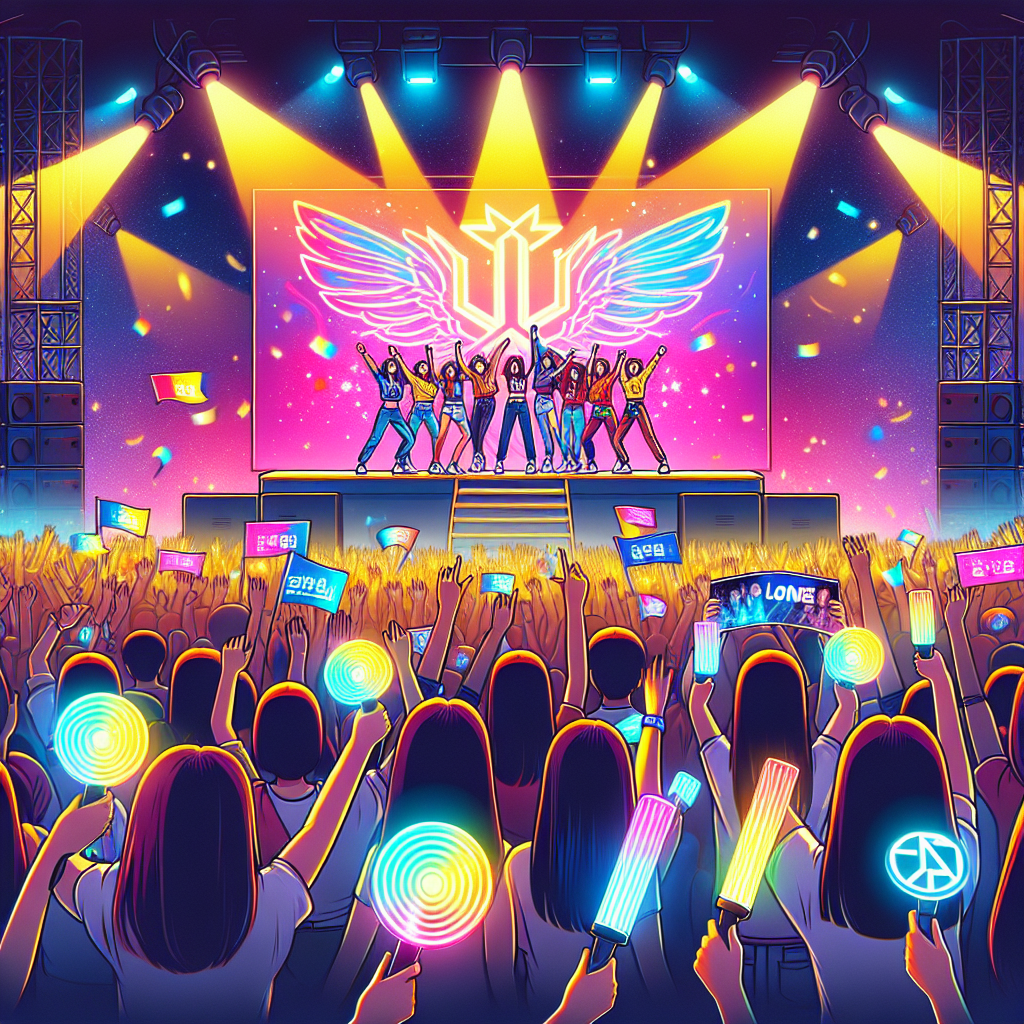K-pop star Karina recently posted an apology on Instagram for being in a relationship with actor Lee Jae-wook. This apology surprised many outside the K-pop scene, but it sheds light on the world of “super fans” in the industry. These fans go to great lengths to support their favorite stars, such as streaming their music 24/7, organizing mass voting sessions, and even sponsoring digital billboard ads. However, when news of Karina’s relationship broke, some fans reacted negatively, driving a truck to her management agency and questioning whether their love and support was enough.
This reaction contrasts with how celebrities’ romantic lives are often publicized and celebrated in other parts of the world. The difference in attitudes can be attributed to the concept of “false intimacy” that exists between K-pop idols and their fans. Fans often view themselves as being in one-sided relationships with the idols, expending time, energy, and money on them. As the industry encourages fans to express their fandom through consumerism, their desire for compensation grows, leading to demands and sometimes even threats.
K-pop agencies have facilitated this “false intimacy” by creating social apps that give fans a glimpse into their idols’ lives. Fans are also actively involved in promoting their idols’ success by streaming their music, voting for them on music platforms and award shows, and sharing voting schedules and streaming guides. Large fan groups organize themselves into teams to navigate the rules for each platform and ensure their idols’ success. However, this level of involvement comes at a cost, both in terms of time and money.
Some idols may feel obligated to keep their fans happy due to the fragility of their careers. The short-lived nature of K-pop groups, typically lasting four to five years, puts pressure on idols to maintain a positive image and assure fans of their dedication to their music. However, as K-pop gains global popularity, attitudes in the industry may be changing. Many international fans expressed outrage at Karina’s apology, and there is hope that fan bases will become more supportive and open-minded in the future.
In conclusion, the world of K-pop is driven by passionate “super fans” who go to great lengths to support their favorite idols. However, this level of devotion can sometimes lead to negative reactions when idols’ private lives are revealed. As the industry evolves and gains global recognition, there is hope for a more supportive and open-minded fan culture in the future.
Original news source: How jealous K-pop super fans try to dictate their idols’ private lives (BBC)
🎧 Listen:
Slow
Normal
Fast
📖 Vocabulary:
| 1 | apology | An expression of regret or sorrow for having done something wrong |
| 2 | industry | The organized action of making or selling goods and services |
| 3 | streaming | The continuous playing of video or audio material on a computer or mobile device |
| 4 | negative | Characterized by or expressing disapproval or dissent |
| 5 | celebrities | Famous people, especially in entertainment or sport |
| 6 | attitudes | A settled way of thinking or feeling about something |
| 7 | consumerism | The protection or promotion of the interests of consumers |
| 8 | compensation | Something, typically money, awarded to someone in recognition of loss, suffering, or injury |
| 9 | fragility | The quality of being easily broken or damaged |
| 10 | pressure | The force or influence that encourages someone to do something |
| 11 | dedicated | Committed or resolved in doing something |
| 12 | outrage | A feeling of shock or dismay |
| 13 | supportive | Providing encouragement or emotional help |
| 14 | open-minded | Willing to consider or accept new suggestions and ideas |
| 15 | devotion | Profound dedication or attachment to a cause or person |
Group or Classroom Activities
Warm-up Activities:
– News Summary
Instructions: Divide the class into small groups. Give each group a few minutes to read the article. Then, ask each group to summarize the main points of the article in a news format, including the who, what, when, where, why, and how. Each group will take turns presenting their news summary to the class.
– Opinion Poll
Instructions: Write three discussion questions related to the article on the board. For example: 1) Do you think K-pop idols should be allowed to have private relationships? 2) Do you think “super fans” have a positive or negative impact on the industry? 3) Should K-pop agencies do more to protect their idols’ privacy? Divide the class into pairs or small groups and give them a few minutes to discuss each question. Then, conduct an opinion poll by asking each group to share their opinions and reasons with the rest of the class.
– Sketch It
Instructions: Divide the class into pairs. Give each pair a whiteboard or a piece of paper and a marker or pen. Instruct one student to describe a scene or situation related to the article to their partner without mentioning any specific names or details. The other student must then try to sketch what they think is being described. After a few minutes, have the pairs switch roles and repeat the activity. Finally, have the pairs share and compare their sketches with the rest of the class.
– Vocabulary Pictionary
Instructions: Write a list of vocabulary words from the article on the board. For example: K-pop, super fans, false intimacy, idols, fragility. Divide the class into two teams. One student from each team will take turns choosing a word from the list and attempting to draw it on the board, while their team members try to guess the word. Set a time limit for each round and keep score. The team with the most points at the end wins.
– Think-Pair-Share
Instructions: Ask the students to think about and write down their personal opinions on the following question: “Do you think the concept of ‘false intimacy’ between K-pop idols and their fans is unique to the industry, or does it exist in other forms of entertainment as well?” Give the students a few minutes to brainstorm and write their thoughts. Then, pair them up and have them share and discuss their opinions with their partners. Finally, open up the discussion to the whole class and encourage students to share their findings and insights.
🤔 Comprehension Questions:
1. Why did Karina apologize on Instagram?
2. How do “super fans” support their favorite K-pop stars?
3. How did some fans react when news of Karina’s relationship broke?
4. How does the reaction to celebrities’ romantic lives differ in other parts of the world?
5. What is the concept of “false intimacy” between K-pop idols and their fans?
6. How do K-pop agencies facilitate this “false intimacy”?
7. What are some of the ways fans actively promote their idols’ success?
8. Why do some idols feel obligated to keep their fans happy?
Go to answers ⇩
🎧✍️ Listen and Fill in the Gaps:
K-pop star Karina recently posted an apology on Instagram for being in a relationship with actor Lee Jae-wook. This apology surprised many outside the K-pop scene, but it sheds light on the world of “super fans” in the (1)______. These fans go to great lengths to support their favorite stars, such as streaming their music 24/7, organizing mass voting (2)______, and even sponsoring digital (3)______ ads. However, when news of Karina’s relationship broke, some fans reacted negatively, driving a truck to her management agency and (4)______ whether their love and support was enough.
This reaction contrasts with how celebrities’ romantic (5)______ are often publicized and celebrated in other parts of the (6)______. The difference in attitudes can be attributed to the concept of “false intimacy” that exists between K-pop idols and their fans. Fans often view themselves as being in one-sided relationships with the idols, expending time, energy, and money on them. As the industry encourages fans to express their fandom through consumerism, their (7)______ for (8)______ grows, leading to demands and sometimes even threats.
K-pop agencies have facilitated this “false intimacy” by creating social apps that give fans a glimpse into their idols’ lives. Fans are also actively involved in promoting their idols’ (9)______ by streaming their music, voting for them on music platforms and award shows, and sharing voting schedules and streaming guides. Large fan groups organize themselves into teams to navigate the rules for each platform and (10)______ their idols’ success. However, this level of involvement comes at a cost, both in terms of time and money.
Some idols may feel obligated to keep their fans happy due to the fragility of their careers. The short-lived nature of K-pop groups, typically (11)______ four to five (12)______, puts pressure on idols to maintain a positive image and assure fans of their dedication to their music. However, as K-pop gains global popularity, attitudes in the industry may be changing. Many international fans expressed outrage at Karina’s apology, and there is hope that fan bases will become more (13)______ive and open-minded in the (14)______.
In conclusion, the world of K-pop is driven by passionate “super fans” who go to great lengths to support their (15)______ idols. However, this level of devotion can sometimes lead to negative reactions when idols’ private lives are revealed. As the industry evolves and gains global (16)______, there is hope for a more supportive and open-minded fan culture in the future.
Go to answers ⇩
💬 Discussion Questions:
Students can ask a partner these questions, or discuss them as a group.
1. What is a “super fan” and how do they show their support for their favorite idols?
2. How would you feel if you were a K-pop idol and had to keep your romantic relationships a secret from your fans?
3. Do you think it’s fair for fans to react negatively when idols’ private lives are revealed? Why or why not?
4. How do you think the concept of “false intimacy” affects the relationship between K-pop idols and their fans?
5. Do you think it’s healthy for fans to view themselves as being in one-sided relationships with idols? Why or why not?
6. What are some ways that K-pop agencies have facilitated the “false intimacy” between idols and fans?
7. How do you think the pressure to maintain a positive image affects K-pop idols’ personal lives?
8. Do you think the short-lived nature of K-pop groups contributes to the intense devotion of fans? Why or why not?
9. How do you think the attitudes of international fans differ from those of fans in South Korea when it comes to idols’ private lives?
10. Do you think fan culture in the K-pop industry will become more supportive and open-minded in the future? Why or why not?
11. How do you think the global popularity of K-pop will impact the industry and fan culture?
12. Do you think it’s fair for fans to demand compensation from idols for their support? Why or why not?
13. How would you feel if you were a K-pop idol and had to constantly navigate the rules of different platforms to ensure your success?
14. Do you think the intense devotion of fans in the K-pop industry is healthy for the idols? Why or why not?
15. How do you think the K-pop industry can strike a balance between maintaining a positive image and allowing idols to have personal lives?
Individual Activities
📖💭 Vocabulary Meanings:
Match each word to its meaning.
Words:
1. apology
2. industry
3. streaming
4. negative
5. celebrities
6. attitudes
7. consumerism
8. compensation
9. fragility
10. pressure
11. dedicated
12. outrage
13. supportive
14. open-minded
15. devotion
Meanings:
(A) The continuous playing of video or audio material on a computer or mobile device
(B) Famous people, especially in entertainment or sport
(C) Committed or resolved in doing something
(D) The protection or promotion of the interests of consumers
(E) Willing to consider or accept new suggestions and ideas
(F) A feeling of shock or dismay
(G) A settled way of thinking or feeling about something
(H) Profound dedication or attachment to a cause or person
(I) Providing encouragement or emotional help
(J) Something, typically money, awarded to someone in recognition of loss, suffering, or injury
(K) Characterized by or expressing disapproval or dissent
(L) The organized action of making or selling goods and services
(M) The force or influence that encourages someone to do something
(N) The quality of being easily broken or damaged
(O) An expression of regret or sorrow for having done something wrong
Go to answers ⇩
🔡 Multiple Choice Questions:
1. What did K-pop star Karina apologize for on Instagram?
(a) Not releasing new music
(b) Being in a relationship with actor Lee Jae-wook
(c) Canceling a concert
(d) Criticizing her fans
2. What do “super fans” in the K-pop industry do to support their favorite stars?
(a) Organize mass voting sessions
(b) Sponsor digital billboard ads
(c) All of the above
(d) Stream their music 24/7
3. How did some fans react when news of Karina’s relationship broke?
(a) Negatively
(b) Positively
(c) Indifferently
(d) Excitedly
4. What is the concept of “false intimacy” in the K-pop industry?
(a) Celebrities’ romantic lives being publicized and celebrated
(b) Fans demanding compensation from idols
(c) Fans viewing themselves as being in one-sided relationships with idols
(d) K-pop agencies creating social apps for fans
5. How do fans actively promote their idols’ success in the K-pop industry?
(a) Streaming their music
(b) Voting for them on music platforms and award shows
(c) Sharing voting schedules and streaming guides
(d) All of the above
6. Why might some idols feel obligated to keep their fans happy?
(a) The pressure to maintain a positive image
(b) The need to assure fans of their dedication to music
(c) All of the above
(d) The short-lived nature of K-pop groups
7. How do K-pop agencies facilitate the concept of “false intimacy”?
(a) By organizing mass voting sessions
(b) By creating social apps for fans
(c) By sponsoring digital billboard ads
(d) By streaming idols’ music 24/7
8. What is the hope for fan culture in the future of the K-pop industry?
(a) That it becomes more demanding and critical
(b) That it remains the same
(c) That it becomes more supportive and open-minded
(d) That it becomes less involved in idols’ personal lives
Go to answers ⇩
🕵️ True or False Questions:
1. These fans go to great lengths to support their favorite stars, such as streaming their music 24/7 and organizing mass voting sessions.
2. K-pop agencies have created social apps that limit fans’ access to their idols’ lives, reducing the sense of “false intimacy.”
3. The incident obscures the world of “super fans” in the K-pop industry.
4. The apology surprised many people outside of the K-pop scene.
5. K-pop star Karina recently apologized on Instagram for being in a relationship with actor Lee Jae-wook.
6. Some fans reacted positively to the news of Karina’s relationship, even driving a truck to her management agency.
7. Celebrities’ romantic lives are often kept private and not widely publicized in other parts of the world, in contrast to the negative reaction from K-pop fans.
8. The concept of “false intimacy” exists between K-pop idols and their fans, leading to demands and threats from fans.
Go to answers ⇩
📝 Write a Summary:
Write a summary of this news article in two sentences.
Writing Questions:
Answer the following questions. Write as much as you can for each answer.
1. What are some of the ways that “super fans” in the K-pop industry support their favorite idols?
2. How did fans react when news of K-pop star Karina’s relationship was revealed?
3. How does the concept of “false intimacy” contribute to the attitudes of K-pop fans towards their idols?
4. What role do K-pop agencies play in facilitating the “false intimacy” between idols and fans?
5. How does the short-lived nature of K-pop groups impact the way idols interact with their fans?
✅ Answers
🤔✅ Comprehension Question Answers:
1. Why did Karina apologize on Instagram?
Karina apologized on Instagram for being in a relationship with actor Lee Jae-wook.
2. How do “super fans” support their favorite K-pop stars?
“Super fans” support their favorite K-pop stars by streaming their music 24/7, organizing mass voting sessions, and even sponsoring digital billboard ads.
3. How did some fans react when news of Karina’s relationship broke?
Some fans reacted negatively when news of Karina’s relationship broke. They drove a truck to her management agency and questioned whether their love and support was enough.
4. How does the reaction to celebrities’ romantic lives differ in other parts of the world?
In other parts of the world, celebrities’ romantic lives are often publicized and celebrated, whereas in the K-pop industry, fans may react negatively and question their idols’ dedication.
5. What is the concept of “false intimacy” between K-pop idols and their fans?
The concept of “false intimacy” refers to the one-sided relationships that fans feel they have with K-pop idols. Fans invest time, energy, and money into their idols and view themselves as being intimately connected to them.
6. How do K-pop agencies facilitate this “false intimacy”?
K-pop agencies facilitate “false intimacy” by creating social apps that give fans a glimpse into their idols’ lives. Fans are also actively involved in promoting their idols’ success through streaming, voting, and sharing schedules.
7. What are some of the ways fans actively promote their idols’ success?
Fans actively promote their idols’ success by streaming their music, voting for them on music platforms and award shows, and sharing voting schedules and streaming guides. Large fan groups organize themselves into teams to navigate the rules for each platform.
8. Why do some idols feel obligated to keep their fans happy?
Some idols feel obligated to keep their fans happy because their careers are often short-lived, lasting only four to five years. They need to maintain a positive image and assure fans of their dedication to their music in order to sustain their careers.
Go back to questions ⇧
🎧✍️✅ Listen and Fill in the Gaps Answers:
(1) industry
(2) sessions
(3) billboard
(4) questioning
(5) lives
(6) world
(7) desire
(8) compensation
(9) success
(10) ensure
(11) lasting
(12) years
(13) support
(14) future
(15) favorite
(16) recognition
Go back to questions ⇧
📖💭✅ Vocabulary Meanings Answers:
1. apology
Answer: (O) An expression of regret or sorrow for having done something wrong
2. industry
Answer: (L) The organized action of making or selling goods and services
3. streaming
Answer: (A) The continuous playing of video or audio material on a computer or mobile device
4. negative
Answer: (K) Characterized by or expressing disapproval or dissent
5. celebrities
Answer: (B) Famous people, especially in entertainment or sport
6. attitudes
Answer: (G) A settled way of thinking or feeling about something
7. consumerism
Answer: (D) The protection or promotion of the interests of consumers
8. compensation
Answer: (J) Something, typically money, awarded to someone in recognition of loss, suffering, or injury
9. fragility
Answer: (N) The quality of being easily broken or damaged
10. pressure
Answer: (M) The force or influence that encourages someone to do something
11. dedicated
Answer: (C) Committed or resolved in doing something
12. outrage
Answer: (F) A feeling of shock or dismay
13. supportive
Answer: (I) Providing encouragement or emotional help
14. open-minded
Answer: (E) Willing to consider or accept new suggestions and ideas
15. devotion
Answer: (H) Profound dedication or attachment to a cause or person
Go back to questions ⇧
🔡✅ Multiple Choice Answers:
1. What did K-pop star Karina apologize for on Instagram?
Answer: (b) Being in a relationship with actor Lee Jae-wook
2. What do “super fans” in the K-pop industry do to support their favorite stars?
Answer: (d) Stream their music 24/7
3. How did some fans react when news of Karina’s relationship broke?
Answer: (a) Negatively
4. What is the concept of “false intimacy” in the K-pop industry?
Answer: (c) Fans viewing themselves as being in one-sided relationships with idols
5. How do fans actively promote their idols’ success in the K-pop industry?
Answer: (a) Streaming their music
6. Why might some idols feel obligated to keep their fans happy?
Answer: (d) The short-lived nature of K-pop groups
7. How do K-pop agencies facilitate the concept of “false intimacy”?
Answer: (b) By creating social apps for fans
8. What is the hope for fan culture in the future of the K-pop industry?
Answer: (c) That it becomes more supportive and open-minded
Go back to questions ⇧
🕵️✅ True or False Answers:
1. These fans go to great lengths to support their favorite stars, such as streaming their music 24/7 and organizing mass voting sessions. (Answer: True)
2. K-pop agencies have created social apps that limit fans’ access to their idols’ lives, reducing the sense of “false intimacy.” (Answer: False)
3. The incident obscures the world of “super fans” in the K-pop industry. (Answer: False)
4. The apology surprised many people outside of the K-pop scene. (Answer: True)
5. K-pop star Karina recently apologized on Instagram for being in a relationship with actor Lee Jae-wook. (Answer: True)
6. Some fans reacted positively to the news of Karina’s relationship, even driving a truck to her management agency. (Answer: False)
7. Celebrities’ romantic lives are often kept private and not widely publicized in other parts of the world, in contrast to the negative reaction from K-pop fans. (Answer: False)
8. The concept of “false intimacy” exists between K-pop idols and their fans, leading to demands and threats from fans. (Answer: True)
Go back to questions ⇧












